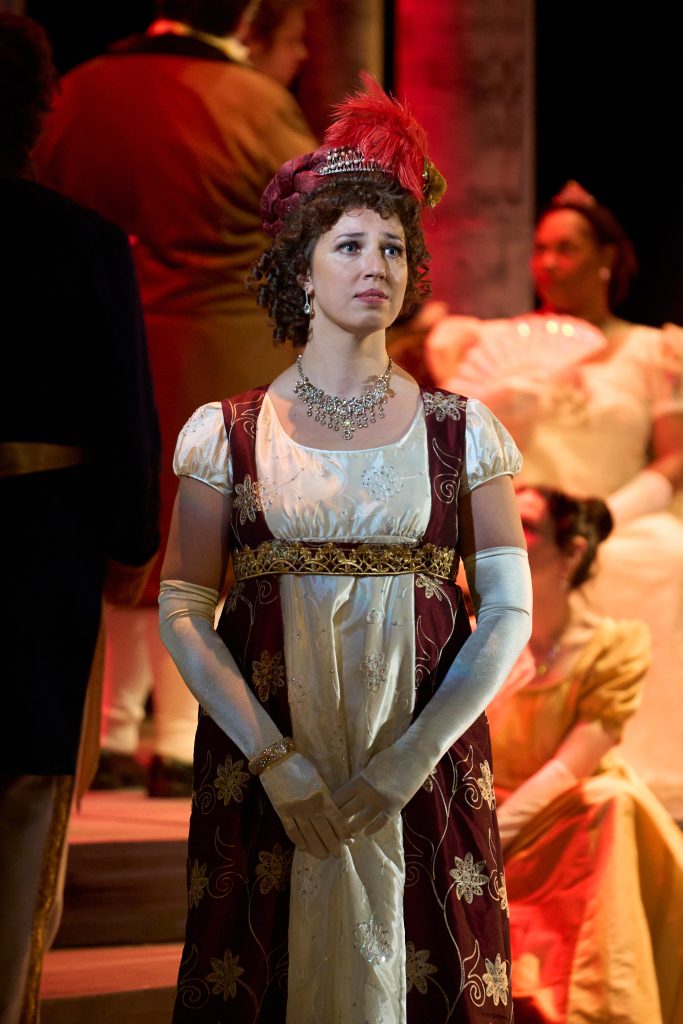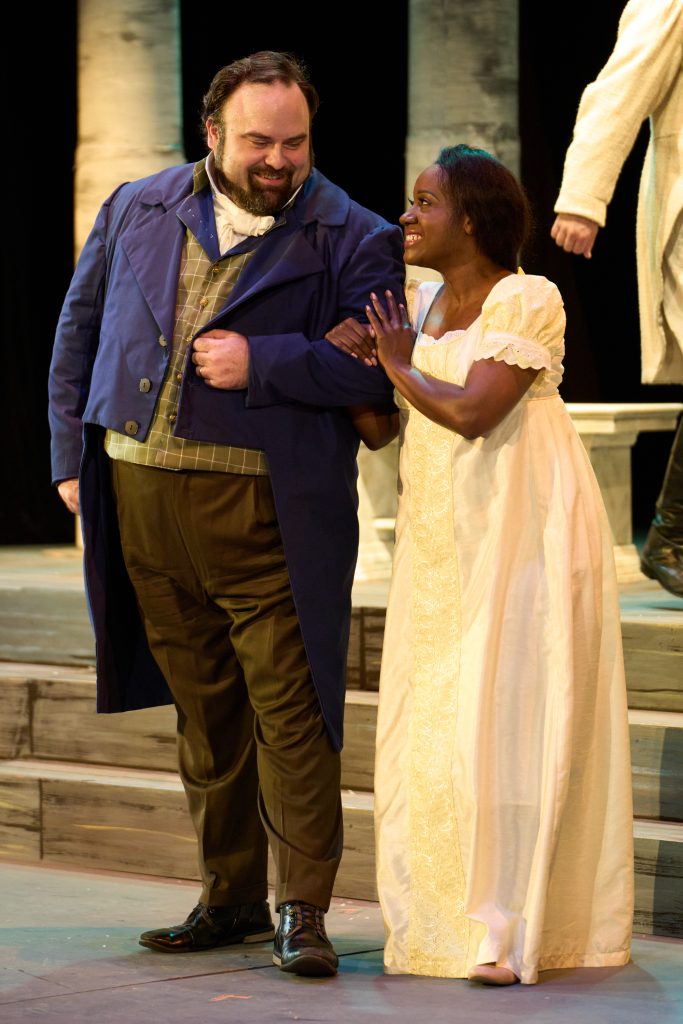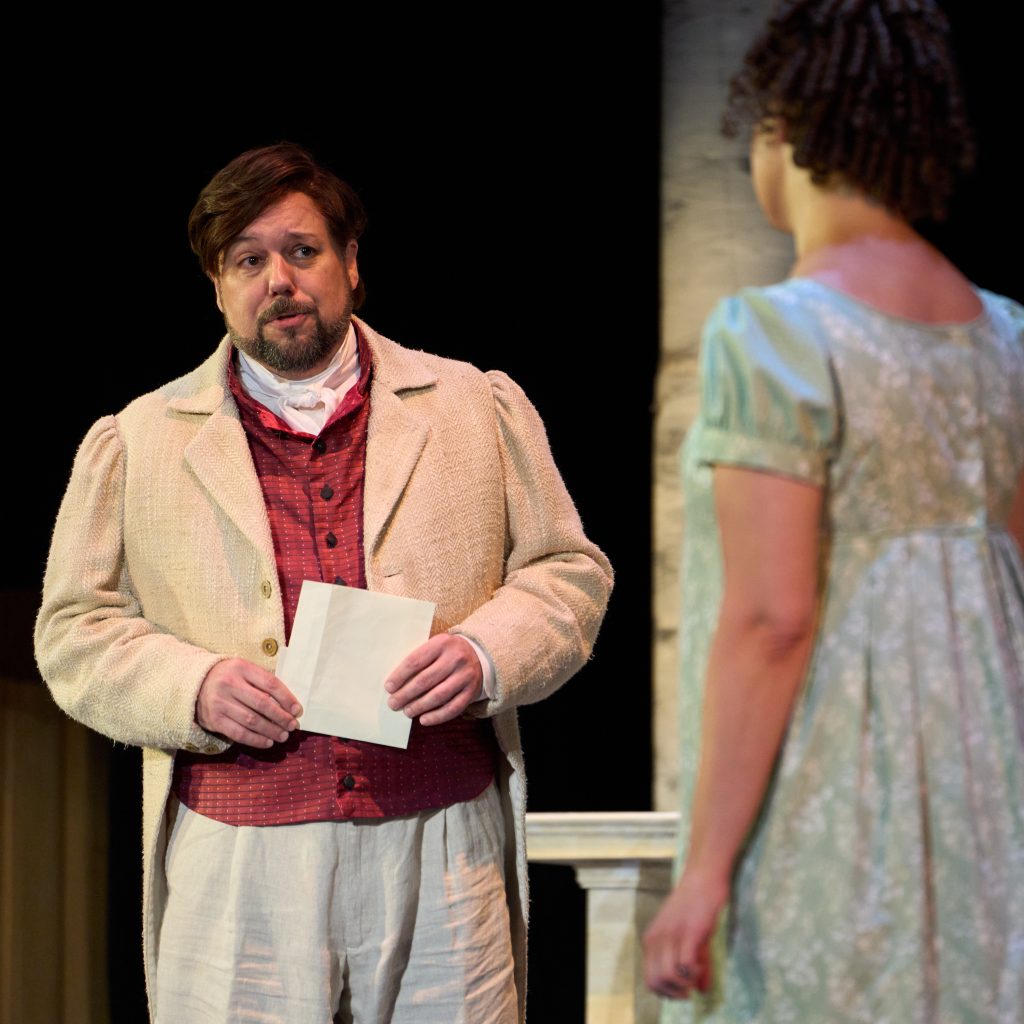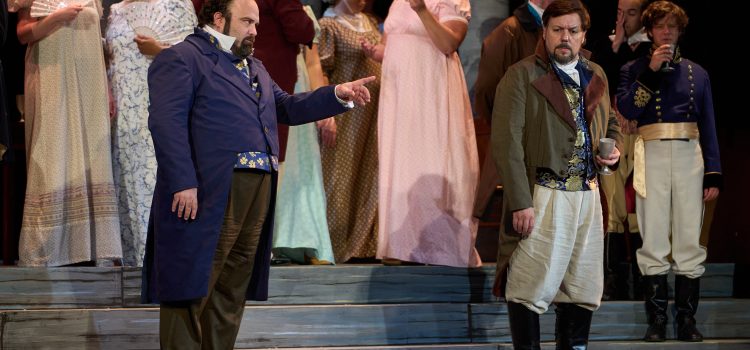By C. B. Adams
“Eugene Onegin,” the opera based on Alexander Pushkin’s verse novel of the same name, inspired another great writer, Anton Chekhov, to write a short story-cum-homage to the opera, “After the Theatre.” In it, Chekhov observed, “There was something beautiful,
touching and romantic about A loving B when B wasn’t interested in A. Onegin was attractive in not loving at all, while Tatyana was enchanting because she loved greatly. Had they loved equally and been happy they might have seemed boring.”
Good point. And, as we all know from yet another member of the Russian literati, Leo Tolstoy, “All happy families are alike, but every unhappy family is unhappy in its own way.”
This is a review of Union Avenue Opera’s production of “Eugene Onegin,” not a Russian Lit course. But, as the opera builds to its final act, one must decide whether the lead characters’ unhappiness resonates in a fulfilling way. Do we cheer Tatyana as she finally
spurns Onegin after he ungraciously spurned her two acts earlier?
Do we feel Onegin’s misery and despair at his impending loneliness? Do we cheer his comeuppance? Or do we embrace that tragic ambiguity?
It’s the players more than the libretto that help shape any (or none) of those answers. This year has been an interesting St. Louis opera season for strong women. Opera Theater of St. Louis put forth a tough-gal “Carmen,” sung by Sarah Mesko, and Union Avenue
offered a resilient Tatyana sung by the Russian-born-and-trained Zoya Gramagin, making her Union Avenue debut.

Even in Act I, when Tatyana is a young and naïve country woman writing a gushy love letter to Onegin, Gramagin used her clear soprano to imbue Tatyana with innocence and undercurrent of strength. This Tatyana was no Cinderella, and this was most evident by Act III when she is now married to a prince. Onegin finally becomes smitten and she spurns him. Of all the characters in this “Onegin,” Gramagin’s Tatyana was the only one who seemed to have truly changed, placing her at the emotional core of this production.
Balancing the youthfulness of Tatyana was baritone Robert Garner as Eugene Onegin. Garner’s voice was rich, emotive and a pleasure to experience, though it was a challenge to identify with his narcissism and dismissiveness. Some “bad guys” you learn to like
(think Walter White in “Breaking Bad”), others you just have to endure. Garner’s Onegin was handsome, rakish and self-centered – qualities that he neither shed nor eschewed.
The only reward for his inability to change seemed to be the lonely life that awaits him. Onegin may have been the last character on stage, but Tatyana had the best last word as she operatically and metaphorically dropped the mic. This being a Russian opera, with libretto by Pytor Ilyich Tchaikovsky no less, it’s appropriate to liken it to a matryoshka doll, with production elements nestled inside production elements.
Tatyana and Onegin may be the protagonists in the story, but they also require equally strong performances from the ensemble, which they certainly had in Union Avenue’s production. In fact, other than Garner’s Tatyana, tenor William Davenport as Lensky provided the
most engaging and relatable performance. His superb voice, especially during the “friendship” aria in Act II, was a highlight, and his ability to reveal Lensky’s character was well matched to Onegin’s shallowness.
Rounding out the solid cast was Melody Wilson as a Tatyana’s younger sister/bestie, Olga, and basso Isaiah Musik-Ayala as Tatyana’s princely husband, Prince Gremin, who delivered a powerful area about her. Also nestled inside this matryoshka was a solid supporting cast and chorus and the always-fine orchestra under the direction of Scott Schoonover.

Union Avenue’s modestly sized stage provides challenges for large casts – a challenge that stage director Octavio Cardenas successfully surmounted. When the stage was full to the gills, it never felt constricted or distracting, not even during a peasant dance or polonaise, choreographed by Jennifer Medina.
One of the weakest elements of this matryoshka was Patrick Huber’s scenic design that included a series of tall, birch-like trees that worked well in Act II, but less so in later acts. The costumes by Teresa Doggett were superb, but some of the props appeared a bit
tired.
“Eugene Onegin” was a fine way for Union Avenue to return to its home stage after two years in the pandemic hinterlands. And at the conclusion of the performance, with Gramagin’s Tatyana still pleasantly in mind, one might remember of something from
Boris Pasternak in another tragic Russian love story, “Doctor Zhivago,” “If it’s so painful to love and absorb electricity, how much more painful it is to be a woman, to be the electricity, to inspire love.”
Union Avenue Opera presents “Eugene Onegin” July 8, 9, 15, 16 at 8 p.m. at Union Avenue Christian Church. For more information,
visit www.unionavenueopera.org


CB Adams is an award-winning fiction writer and photographer based in the Greater St. Louis area. A former music/arts editor and feature writer for the St. Louis Globe-Democrat, his non-fiction has been published in local, regional and national publications. His literary short stories have been published in more than a dozen literary journals and his fine art photography has been exhibited in more than 40 galley shows nationwide. Adams is the recipient of the Missouri Arts Council’s highest writing awards: the Writers’ Biennial and Missouri Writing!. The Riverfront Times named him, “St. Louis’ Most Under-Appreciated Writer” in 1996.

